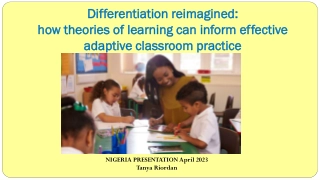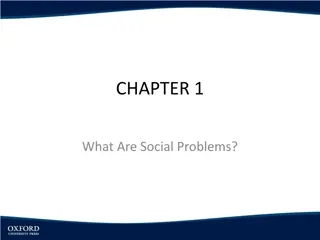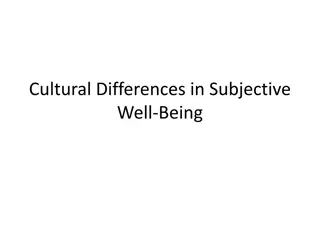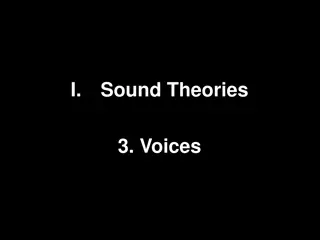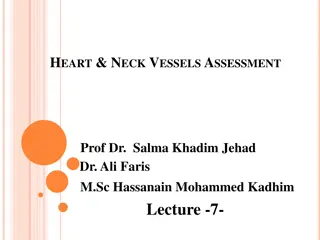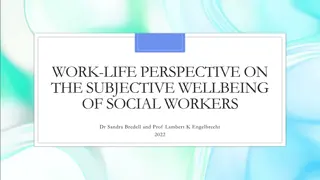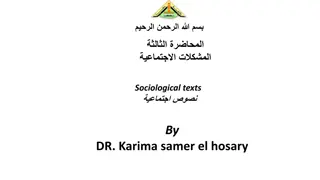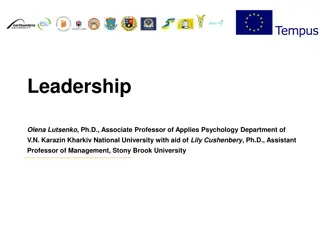Reimagining Differentiation: Enhancing Classroom Practice Through Learning Theories
Explore how theories of learning can inform effective adaptive classroom practice, focusing on the concept of differentiation. The presentation delves into reimagining differentiation, key theories supporting it, and practical strategies to support differentiation in language classrooms. The researc
0 views • 35 slides
Documentation Strategies for Patient Progress in SOAP Notes
Common format for SOAP Notes documentation includes Subjective, Objective, Assessment, and Plan sections. Subjective notes involve patient information and history, while Objective notes detail examination findings. Effective documentation strategies include organization, use of active verbs, and dir
2 views • 33 slides
Leadership Theories and Power Dynamics in Organizations
Explore contingency theories, dyadic theories, power and influence concepts, and leadership lessons from "12 Angry Men". Dive into the significance of leader-member exchange (LMX), political skills, and the interplay between power, politics, and organizational efficiency.
0 views • 27 slides
Understanding Relativism and its Impact on Critical Thinking
Relativism poses a challenge to critical thinking by asserting that truth is subjective and varies from person to person or society to society. While some forms of relativism, like relativity, can be rational, global relativism faces self-referential inconsistency. Values relativism is commonly appl
0 views • 25 slides
Theories Explaining Deviant Sexual Behavior Throughout History
Explore historical theories on deviant sexual behavior, including demonological, anomie, psychoanalytical, human ecology, and somatotyping theories. These theories range from supernatural beliefs of possession to scientific interpretations of societal influences and individual characteristics.
2 views • 33 slides
Understanding Facts and Opinions in Reading Comprehension
Reading comprehension involves distinguishing between facts and opinions in a text. Facts can be objectively proven, while opinions are subjective reflections of personal feelings. Recognizing the difference is crucial for essay writing and critical analysis. By examining cues and asking specific qu
2 views • 9 slides
Understanding Social Problems: A Sociological Perspective
Social problems are conditions or behaviors that cause public concern and require collective action. Sociology, particularly in the study of social issues, aims to identify both objective elements like measurable harm and subjective elements like moral evaluations. These subjective beliefs can shape
0 views • 34 slides
Understanding the Importance of Positive Psychology and Subjective Well-Being
Positive psychology emphasizes the significance of happiness, satisfaction, and well-being in people's lives. Subjective well-being (SWB) focuses on individuals' evaluations and feelings about their lives rather than just objective conditions. Enhancing SWB is not only about feeling better but also
1 views • 48 slides
Psychological Theories of Criminality: Understanding the Roots
Psychological theories of criminality delve into the association between intelligence, personality, learning, and criminal behavior. Major theories include Psychodynamic Theory by Freud, Behavioral Theory by Bandura, and Cognitive Theory by Kohlberg. These theories explore how unconscious mental pro
1 views • 20 slides
Cultural Contrasts in Subjective Well-Being: Factors and Values
Societies exhibit varying levels of well-being influenced by factors such as wealth, stability, and culture. Economic development, social stability, and individualist-collectivist values play crucial roles. Broad socioeconomic indicators like GDP and life expectancy impact well-being significantly.
1 views • 49 slides
Exploring Leadership Theories: Traits and Behaviors
Leadership theories have evolved from trait theory focusing on personal qualities to behavioral theories emphasizing actions and interactions. While early research sought universal traits for leadership, it encountered challenges due to varied traits among leaders and non-leaders. Behavioral theorie
2 views • 29 slides
Unraveling COVID-19 Conspiracy Theories and Hoaxes
Exploring various conspiracy theories surrounding the origins of COVID-19, from bat soup to bioweapons and espionage. Dive into wilder theories involving population control, world war, and even Disney's supposed predictions. Understand the differences between conspiracy theories and hoaxes, shedding
2 views • 11 slides
Understanding Sociological Theories and Frameworks
Sociological theories, encompassing micro and macro perspectives, provide a lens to interpret societal dynamics. Consensus theories like functionalism emphasize shared norms, while conflict theories such as Marxism highlight social inequalities. Social action theories like interactionism focus on in
3 views • 21 slides
Online Seminar: Theories of Learning in Initial Teacher Education
This collection of online seminar slides introduces pre-service teachers to major theories of learning, including the Science of Learning through cognitive neuroscience. The presentation aims to help educators consider implications for teaching, recognize theories in action, and pose critical questi
1 views • 11 slides
Theories of Causation in Psychological and Social Sciences
Overview of theories of causation categorized into psychological, social psychological, and sociological perspectives. Psychological theories focus on instinctive, biological, and psychological qualities of abusers, including Attachment Theory, Psychodynamic Theory, Social Learning Theory, and Situa
0 views • 15 slides
Introduction to Quantum Chromodynamics & Field Theories in High-Energy Physics
Explore the fundamentals of Quantum Chromodynamics and Classical Field Theories in this informative lecture, covering topics such as global and local symmetries, Lagrangians, actions, and dynamics. Understand the significance of global and local symmetries in classical field theories, along with exa
2 views • 17 slides
Comprehensive Overview of Student Affairs Theories
This collection explores key theories in student affairs, including cognitive-structural theories, learning theories, and person-environment theories. Cognitive-structural theories delve into how individuals process information, while learning theories examine how people absorb knowledge. Person-env
3 views • 19 slides
Understanding Theories and Concepts in Research
The content delves into the fundamental concepts of theories and variables in research. It discusses the nature of theories, including descriptive, explanatory, and predictive theories. Additionally, it examines the role of concepts in providing identity and meaning to objects and phenomena. Through
2 views • 55 slides
Classical Trade Theories and Their Limitations in International Economics
Classical trade theories such as the Theory of Absolute Advantage by Adam Smith and the Theory of Comparative Advantage by David Ricardo highlight the benefits of free trade and specialization based on natural advantages. However, these theories have limitations, such as the inability to explain sce
0 views • 8 slides
Group Decision-Making: The Wisdom of Crowds and Stupidity of Herds
This presentation by Richard Zeckhauser of Harvard University delves into the importance of rational analysis and subjective probability in group decision-making processes. It emphasizes the need to focus on collective wisdom while avoiding biases that can affect group decisions. Key concepts covere
2 views • 22 slides
Applying Theories and Models in Integrated Health: Module 3 Overview
This module delves into the application of various theories, perspectives, and practice models in integrated healthcare. Students will learn to utilize different theories to enhance their understanding and practice in integrated health, focusing on aspects like personal impact, behavioral change the
0 views • 78 slides
Understanding Nationalism in Political Science
Nationalism, a complex concept, defines the nation as the fundamental unit of political rule. It encompasses a mix of objective and subjective factors, including cultural, ethnic, and political traits. The definition of a nation is subjective, based on how its members perceive themselves as a distin
0 views • 27 slides
Effectiveness of Psychological Intervention in Managing Stress and Depression Among Cancer Patients
A study was conducted to assess the effectiveness of a psychological intervention program in managing stress, depression, and subjective well-being among cancer patients. The study involved 132 cancer patients aged 35 to 65 years, with 72 patients in the experimental group receiving psychological in
1 views • 48 slides
QBism and Convivial Solipsism in Quantum Interpretations
QBism and Convivial Solipsism present different interpretations of quantum mechanics, focusing on the subjective nature of probabilities and experiences within the quantum formalism. QBism emphasizes the subjective interpretation of probability, considering the quantum state as a tool for assigning
0 views • 30 slides
Exploring EFL Teachers' Subjective Theories on Pronunciation Training
This study delves into EFL teachers' subjective theories regarding pronunciation training, with a focus on Internet-supported practices. Through semi-structured interviews, 11 high school EFL teachers shared their views and attitudes on the importance of pronunciation training in EFL classrooms, as
0 views • 13 slides
Accelerating Lemma Learning Using Joins in Satisfiability Modulo Theories
Explore the use of joins in accelerating lemma learning within the context of Satisfiability Modulo Theories (SMT). The study covers various SMT applications at Microsoft and delves into the development of the Z3 solver. Key topics include theories, arithmetic operations, array theory, uninterpreted
0 views • 25 slides
Comprehensive Guide to Abdominal Assessment for Healthcare Professionals
This lecture by Hassanain Mohammed Kadhim covers the essential techniques and subjective data needed for a thorough abdominal assessment. It includes objectives, equipment required, preparation steps, subjective data collection, inspection guidelines, abdominal landmarks, common causes of abdominal
0 views • 21 slides
Comparative Analysis of Institutionalization and Subjective Wellbeing in Europe
This study explores the impact of institutionalization on subjective wellbeing in Europe, comparing private homes and nursing homes. The research examines the desire to avoid nursing homes, especially heightened by the COVID-19 pandemic, and investigates the wellbeing of older Europeans in different
0 views • 14 slides
Causal Effects of Health on Retirement Using Subjective Conditional Expectations
This research explores the impact of health on retirement decisions by analyzing subjective conditional expectations of older workers. By studying the relationship between health, work, and retirement planning, the study aims to provide insights into policy implications for ensuring the future solve
0 views • 19 slides
Understanding Key Concepts of Insurance
Key notions of insurance include fortuitous loss, risk occurrence, loss exposure, objective and subjective risk, and the law of large numbers to predict future loss experience. Objective risk is based on actual loss variation, while subjective risk is based on individual perception. Understanding th
0 views • 26 slides
Exploring Theories and Concepts of Voice and Self-Expression
Delve into the realm of voice, self-expression, and consciousness through various theories and perspectives by thinkers such as Derrida and Barthes. The concept of voice is examined in relation to presence, uniqueness, power, and language, highlighting its subjective and spiritual dimensions. Explor
0 views • 34 slides
Theories and Concepts in Semantics: Classical vs. Prototype Approaches
Explore different theories of concepts in semantics, including classical theories based on necessary and sufficient conditions, causal theories, and prototype theories. Compare their strengths and limitations in handling fuzziness, asymmetry, and internal structure of concepts. Discover how experime
1 views • 46 slides
Integrating Theories and Models for Enhanced Health Practice
Explore the application of theories, perspectives, and practice models in integrated health through Module 3. Learn how theories guide assessment, treatment, and patient outcomes. Discover common theories enhancing assessment and supporting individuals through grief and loss. Gain insights into the
0 views • 78 slides
Comprehensive Overview of Leadership Theories and Styles
Leadership encompasses the ability to influence a group towards achieving goals by knowing oneself, communicating vision, building trust, and taking effective action. Various leadership styles include Autocratic, Democratic, Free-Rein, and Paternalistic, each with distinct decision-making approaches
0 views • 19 slides
Exploring Philosophical Perspectives on the Meaning of Life
Delve into discussions on atheism, naturalism, theories of meaning, subjective and objective aspects of experience, theories of value, and the role of God in understanding the purpose and significance of human life. Philosophers like Susan Wolf and Joseph Raz offer insights into how engaging in valu
0 views • 11 slides
Heart and Neck Vessels Assessment Overview
This information presents a comprehensive guide for heart and neck vessels assessment, including objectives, necessary equipment, preparation steps, subjective data to consider, techniques for palpating and auscultating the carotid artery, normal findings, and more. It emphasizes the importance of s
0 views • 23 slides
Cognitive Study of Subjectivity Extraction in Sentiment Annotation
A cognitive study on extracting subjectivity in sentiment annotation, exploring if humans perform subjective extraction similarly to machines for sentiment analysis. The study investigates sentiment oscillations and different methods adopted based on the nature of subjective documents.
0 views • 14 slides
Understanding Subjective Wellbeing of Social Workers in South Africa
Gain insights into the subjective wellbeing of social workers in South Africa within the context of work-life balance. Explore perceptions of work-life balance and subjective wellbeing, aiming to provide recommendations for improving the overall wellbeing of social workers. The study uses theoretica
0 views • 24 slides
Evolution of Sociological Perspectives on Social Problems
The study of social problems has evolved dramatically since the 1970s, shifting from an objectivist approach to a more subjective and constructionist perspective. This shift acknowledges that what is considered a social problem is a matter of definition, and focuses on the social processes involved
0 views • 12 slides
Understanding Leadership Theories and Styles
Leadership involves influencing a group towards a common goal. Traits, interaction styles, and group dynamics play vital roles in effective leadership. Various theories, such as Trait Theories and Synthetic Leadership Theories, provide insights into different aspects of leadership. Understanding lea
0 views • 41 slides
